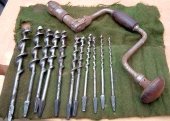It sounds like you're very skilled. And that is a fine vision. Go for it. I kinda wish I had, a long long time ago, but that's ok. Monday night quarterbacking holds no charms
But let me suggest that you consider carefully and perhaps allow flexibility such that you buy certain things that could move you forward timely with your most important goals. (I'm assuming that just owning tools isn't really you main goal?) I doubt there is any shame in buying a fine used tool and bowing deeply in the direction of dedicated engineers and craftsmen whose work made that tool possible and gives you the opportunity.
FWIW, I have found it's almost always cheaper to buy onto the ladder as far up the rungs as you can afford. Provided you know that getting to the top of that ladder really is important to you. And provided you know your values that can allow you to make decent, proper, choices on the rise, sorta speak. Not so say "do it this way". No, there are many many considerations. However. A tool is, well, a tool. A means to an end. When you know you values and your goals then it's possible to make significant choices and not to stick with one way or another. To discern and choose various paths, options. And very often it really _is_ better to buy a good tool than build it.
And I have also found that there are many fine enthusiasts in this country who are actively preserving "old iron" and old working tools of all kinds. They actually kinda need people who will understand the value and just use the damn things. Here is a link to one of those groups which follows both metal and wood working machines. I learned a lot from them 10-15 years ago. If nothing else, they are a good source of detail data on hundreds of old machines.
http://wiki.vintagemachinery.org/History.ashx
However, I once watched a forum where some Irish welder visited once in a while, maybe twice a week. 50? 60 years old? Hard to say. Most of the members were making a living welding, as was he. When some welder was struggling with a problem he would usually be one of the guys who showed up to explain how to get that job done. It slowly became clear that he had not bought a machine for many years but his solutions were almost always the ones chosen. He apparently had a medium sized shop and had mastered and owned a lot of tools. But he didn't seem to use all that many now and simply fabricated any tools he needed (or dug them out of the back 40) and he was able to show others how to do the same. He wasn't the only one like that and it was a fine group with pretty sharp competitive instincts. He was a rare bird who lived his work, from the childs bicycle to the cast iron block, to the aluminum cylinder head to the cracked flywheel on a construction site water truck to a tweaked arm on a quarry exevator... and found that he didn't need all the dials and buttons so much.
So yeah, you can make your tools and it can be GOOD. But a proven tool often embodies deep knowledge. It allows one to create w/out having to already know everything the makers put into that tool. Using that tool somebody else, many somebodys, built and refined, their knowledge and understanding can move into the user, a little. That's a good thing. One of the best real reasons to search out and use the very finest tools one possibly can. That old Irishman didn't _need_ somebody else's tools because he had already absorbed them. Maybe not all of them, not each feature or function. But he knew what those features or functions did, what they were for and he knew how to create the solution using just what was w/in easy reach. _He_ was the tool, all of the tools. But I don't think he started that way. I think he started by using good tools passed down and refined by others and gradually fed his understanding and intuition and body wisdom with the smarts and genius of others drawn from the tools and processes he found or was given. It took a while.
So don't rush. <GG> And if a fine tool offers itself to aid your progress, maybe consider forking over a bit and seeing what it will teach you, where it will take you.
Regards,
Rufus

 2
2




 4
4




 2
2








 2
2













